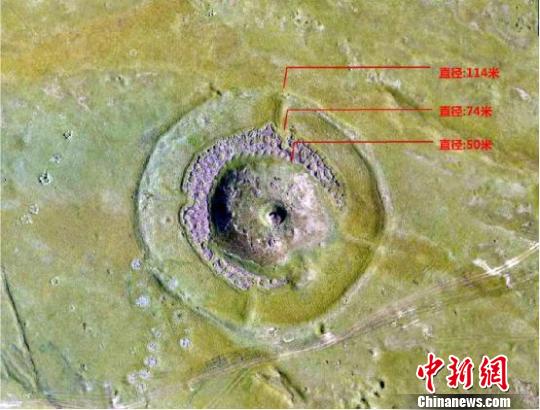Large stone altar from Bronze Age discovered in Xinjiang
- By Wu Jin
 0 Comment(s)
0 Comment(s) Print
Print E-mail China.org.cn, August 9, 2016
E-mail China.org.cn, August 9, 2016
|
|
| Archaeologists in Xinjiang discover a Bronze Age stone altar dedicated to worship of the sun divinity that is probably the largest and best preserved of its kind. [CNS Photo] |
Archaeologists in Xinjiang recently discovered a Bronze Age stone altar dedicated to worship of the sun divinity that is probably the largest and best preserved of its kind.
Wu Xinhua, the team's leading archaeologist, said that the altar is made of cobbles and mud and shaped like a cone surrounded by two stone walls. The diameter of the outermost wall reached 114 meters.
The site, with a minor damage at its top, is one of the important relics yet discovered in Xinjiang, where archaeologists are studying the sun-worship culture among nomadic tribes from the vast prairie in the region.
The history of the altar for sun worship can be traced back to 2,500 to 3,000 years ago in the late Bronze Age, or even a bit earlier, a claim supported by aerial photography and data calculated from mausoleums and graves discovered last year in Russia's Republic of Tuva and Mt. Tianshan in eastern Xinjiang.
The surrounding walls and the sacred crossroads of the altar represent the epitome of indigenous nomadic religions and lifestyles.
Li Jun, deputy director of Xinjiang's Cultural Heritage Administration, said that the discovery will probably help to prove the peaceful interconnection of the peoples along the Silk Road, as the ancient culture discovered in Xinjiang showed many resemblances to those of other countries and regions in Central Asia.







Go to Forum >>0 Comment(s)